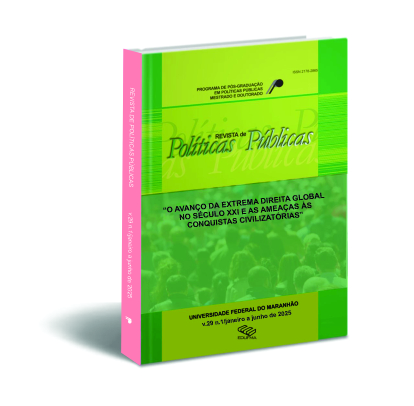The crisis of reason and the advance of authoritarianism: philosophical reflections on the extreme right and democratic fragility
DOI:
https://doi.org/10.18764/2178-2865v29n1.2025.1Keywords:
Far-right, authoritarianism, democracy, reason, political philosophy, polarization, misinformationAbstract
The rise of the far-right in recent decades has raised urgent questions about the foundations of reason and the state of liberal democracies. This article reflects on the collapse of rationality in public debate and the erosion of democratic principles in the face of contemporary authoritarianism. By investigating the philosophical roots of this phenomenon, it analyzes how misinformation, populism, and ideological polarization have compromised society's ability to safeguard civilizational achievements. The article also examines the role of political philosophy in understanding current challenges and confronting threats to fundamental freedoms. Through the lens of thinkers such as Hannah Arendt and Jürgen Habermas, a critical reflection on resistance strategies to radicalization and the importance of reason as a central axis in the reconstruction of healthy democratic dialogue is proposed. The conclusion offers a rethinking of the role of philosophical education as a vital tool for maintaining active citizenship and social justice in times of crisis.
Downloads
References
ARENDT, H. Origens do Totalitarismo. São Paulo: Companhia das Letras, 1951.
ARENDT, H. Eichmann em Jerusalém: um relato sobre a banalidade do mal. São Paulo: Companhia
das Letras, 1963.
ARISTÓTELES. Ética a Nicômaco. Tradução de Edson Bini. São Paulo: Martin Claret, 2009.
BAUMAN, Z. Modernidade e Holocausto. Rio de Janeiro: Zahar Editores, 2001.
BERLIN, I. Dois Conceitos de Liberdade. 1958.
DEWEY, J. Democracia e Educação. Nova Iorque: Macmillan, 1916. Disponível em: https://archive.org/details/democracyandeducation. Acesso em: 13 out. 2024.
FOUCAULT, M. Vigiar e Punir: nascimento da prisão. Petrópolis: Vozes, 1979.
FOUCAULT, M. A Arqueologia do Saber.1969.
HABERMAS, J. The Divided West. Cambridge: Polity Press, 2006.
HABERMAS, J. Between Facts and Norms: Contributions to a Discourse Theory of Law and
Democracy. Cambridge: MIT Press, 1996.
HABERMAS, J. O Discurso Filosófico da Modernidade. 1985.
HABERMAS, J. A Transformação Estrutural da Esfera Pública,1962.
LÉVINAS, E. Totalidade e Infinito: ensaio sobre a exterioridade. Lisboa: Edições 70, 1969.
MOUFFE, C. On the Political. Londres: Routledge, 2005.
MOUFFE, C. The Democratic Paradox. 2000
NIETZSCHE, F. Além do Bem e do Mal.1886.
NIETZSCHE, F. Assim Falou Zaratustra. 1883-1885
RAWLS, J. Uma Teoria da Justiça. São Paulo: Martins Fontes, 1971.
Downloads
Published
How to Cite
Issue
Section
License

This work is licensed under a Creative Commons Attribution-NonCommercial-NoDerivatives 4.0 International License.
UNIVERSIDADE FEDERAL DO MARANHÃO
PROGRAMA DE PÓS-GRADUAÇÃO EM POLÍTICAS PÚBLICAS
REVISTA DE POLÍTICAS PÚBLICAS
Termo de Transferência de Direitos Autorais
Como condição para a submissão, os autores devem declarar a autoria do trabalho e concordar com o Termo de Cessão de Direitos Autorais, marcando a caixa de seleção após a leitura das cláusulas)
- Declaro que participei da elaboração do trabalho referido, em parte ou no todo; que não omiti qualquer ligação ou acordo de financiamento entre os autores e instituições ou empresas que possam ter interesses na publicação desse trabalho;
- Declaro tratar-se de texto original, isento de compilação, em parte ou na íntegra, de minha autoria ou de outro (os) autor (es);
- Declaro que o texto não foi enviado a outra revista (impressa ou eletrônica) e não o será enquanto a possibilidade de sua publicação esteja sendo considerada pela RPP;
- Declaro que transfiro os direitos autorais do trabalho especificado para a RPP, comprometendo-me a não reproduzir o texto, total ou parcialmente, em qualquer meio de divulgação, impresso ou eletrônico, sem prévia autorização dessa Revista.
- Declaro que tenho conhecimento que a cessão do texto à RPP é gratuita e, portanto, não haverá qualquer tipo de remuneração pela sua utilização.

Este obra está licenciado com uma Licença Creative Commons Atribuição-NãoComercial-SemDerivações 4.0 Internacional.







